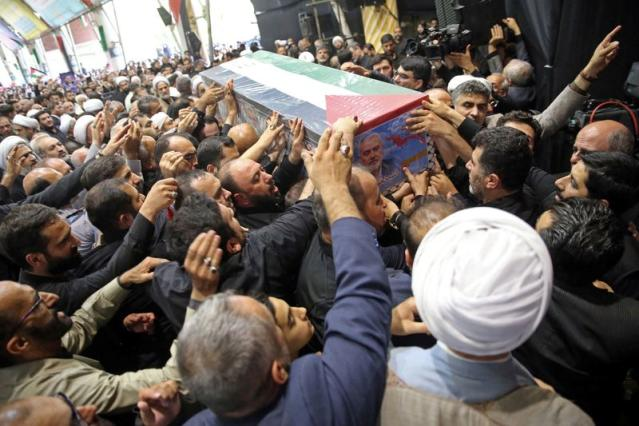Mourners gathered in Qatar to pay their final respects to Ismail Haniyeh, the prominent Hamas leader who was assassinated in Iran earlier this week. Haniyeh, a key figure in the Palestinian resistance movement, was laid to rest following a funeral ceremony at the Imam Muhammed bin Abdul Wahhab mosque, Qatar’s largest, before being buried in Lusail, a city north of Doha.
The assassination of Haniyeh has sent shockwaves through the Palestinian community and the broader Arab and Islamic world. His death, which occurred during a visit to Iran’s capital, has been widely attributed to Israel, although Israeli authorities have not officially claimed responsibility. The attack comes at a time of heightened tensions in the region, following a series of violent incidents that have further destabilized the Middle East.
As Haniyeh’s body arrived in Qatar from Iran, prominent figures within Hamas, including his predecessor Khaled Meshaal, stood on the tarmac at Doha airport to receive the coffin. The somber atmosphere underscored the deep sense of loss felt by the movement, which has long been at the forefront of the struggle against Israeli occupation.
The significance of Haniyeh’s role in the Palestinian resistance cannot be overstated. He had been based in Doha since 2019, after the Hamas political office relocated to the Qatari capital following its closure in Damascus. Haniyeh was instrumental in leading indirect negotiations with Israel over a potential ceasefire in Gaza, a conflict that has resulted in untold suffering for the Palestinian people.
The assassination has drawn widespread condemnation across the Muslim world. Both Turkey and Pakistan declared a day of mourning in Haniyeh’s honor, while Hamas has called for widespread protests across the Palestinian territories. In Tehran, Iran’s Supreme Leader Ayatollah Ali Khamenei vowed “harsh punishment” for Israel, signaling a potential escalation in the already volatile situation.
Haniyeh’s death follows a series of violent incidents that have further inflamed tensions in the region. Days before his assassination, a strike on the Israeli-occupied Golan Heights resulted in the deaths of 12 children and teenagers. Israel blamed Hezbollah for the attack, though the group denied involvement. In retaliation, Israel launched a targeted airstrike in Beirut, killing senior Hezbollah commander Fuad Shukr and several others, including two children.
The circumstances surrounding Haniyeh’s assassination remain murky. While some reports suggest that he was killed by a missile strike, other sources, including a report from the New York Times, claim that a bomb had been planted in the building where he was staying. These conflicting accounts reflect the confusion and secrecy surrounding the attack, which has left the leadership of Hamas in a state of shock.
Haniyeh’s burial marks the end of a week fraught with escalating violence and uncertainty. His assassination is not just a personal loss for his family and comrades but a significant blow to the Palestinian resistance movement. As tensions continue to rise, the risk of further conflict looms large, threatening to plunge the region into deeper turmoil. For the Palestinian people, the death of Ismail Haniyeh is a stark reminder of the ongoing struggle against oppression and the heavy price they continue to pay in their fight for freedom.








